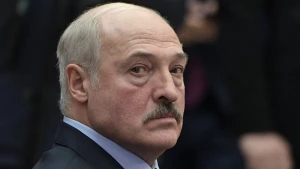
For the past year we have felt completely abandoned - wife of soldier killed in Olenivka
Arina Khavanskykh, wife of a soldier killed in Olenivka, said that the families of soldiers Russia killed in Olenivka are trying to draw attention to this tragedy on their own.
She said this on the Espreso TV channel.
"Over the past year, we have felt abandoned as much as possible. We have been living alone with the tragedy in Olenivka. No one contacts us, no one from the authorities. We are very upset about this. Now we have set up our own organisation and are trying to enter the media space to draw attention and inform people about this tragedy. We understand, unfortunately, that no one will do this," Khavanskih said.
The wife of the deceased soldier stressed that they are trying to draw public attention to the tragedy in Olenivka on their own.
"Now we are actively giving interviews and going on air to tell the truth about the tragedy in Olenivka. Yesterday I had the opportunity to give a speech at the Fine City festival. There we showed footage from Olenivka and portraits of our fallen soldiers. So everything we are doing now, we are doing on our own," she added.
What happened after the Olenivka tragedy on July 29, 2022
Russia accused Ukraine of carrying out the attack: the attack was allegedly carried out by a HIMARS multiple launch rocket system that Kyiv received from the United States. The invaders even showed fragments of what they claimed was a munition allegedly found at the scene. The Russian Defense Ministry invited experts, specialists from the UN and the Red Cross to the colony in Olenivka. However, representatives of international organizations were not granted access to the site of the tragedy.
Later, the Main Intelligence Directorate reported that the attack was carried out by the Wagner PMC mercenaries on the personal instructions of their leader Yevgeny Prigozhin. However, the massacre was not coordinated with the leadership of the Russian Defense Ministry. The main purpose, according to intelligence, was to conceal the facts of embezzlement of funds allocated for the maintenance of Ukrainian prisoners of war. In fact, on August 1, a commission from Moscow was scheduled to arrive in Olenivka to check the costs and conditions of the prisoners of war.
The Russian militants themselves did not believe that the colony could have been shelled by Ukraine, as evidenced by the conversation intercepted by the SBU. The Russians could have arranged the tragedy with the help of explosives they had placed in the colony. In particular, none of the eyewitnesses heard any missile approaching the penal institution. There was no characteristic whistle, and the explosions occurred by themselves.
According to intelligence, the interrogations of the prisoners of war were conducted by investigators from the so-called 'DPR' together with the Wagner fighters and Russian FSB officers. They tried to extract confessions from Ukrainians about alleged crimes against civilians. The Russians did not plan to exchange the tortured prisoners of war and killed them to conceal the facts of torture.
From the statements of the Ukrainian authorities and the list of casualties released by Russia, it appears that most of the killed and wounded were from the Azov regiment. On July 30, 2022, Ukraine began the procedure for returning the bodies of those killed in the Olenivka terrorist attack. In October, the Azov regiment's chief of staff, Bohdan Krotevych, said that 41 Ukrainian soldiers were known to have been killed in Olenivka, but that there was no exact data yet.
On October 11, 2022, Ukraine was able to return the bodies of 62 soldiers, including those killed in the mass execution in Olenivka. However, the exact number of victims of this crime and the list of the dead can only be determined after identification.
Kyiv believes that Russia organized the massacre of Ukrainian prisoners of war in order to accuse and discredit Ukrainian forces (in particular, to prevent the supply of effective weapons to Ukraine). According to the Ukrainian Prosecutor General's Office, the preliminary cause of the explosion in the building could be a thermobaric weapon.
In response to the Russian terrorist attack, the Verkhovna Rada called on the world to recognize Russia as a state sponsor of terrorism and to strengthen sanctions in connection with the killing of Ukrainian prisoners of war. It is worth noting that Lithuania, Latvia, Poland, Estonia, the Czech Republic, the Netherlands, Slovakia, the European Parliament, the Parliamentary Assemblies of the Council of Europe, NATO, and the OSCE have already recognized Russia as a state sponsor of terrorism.
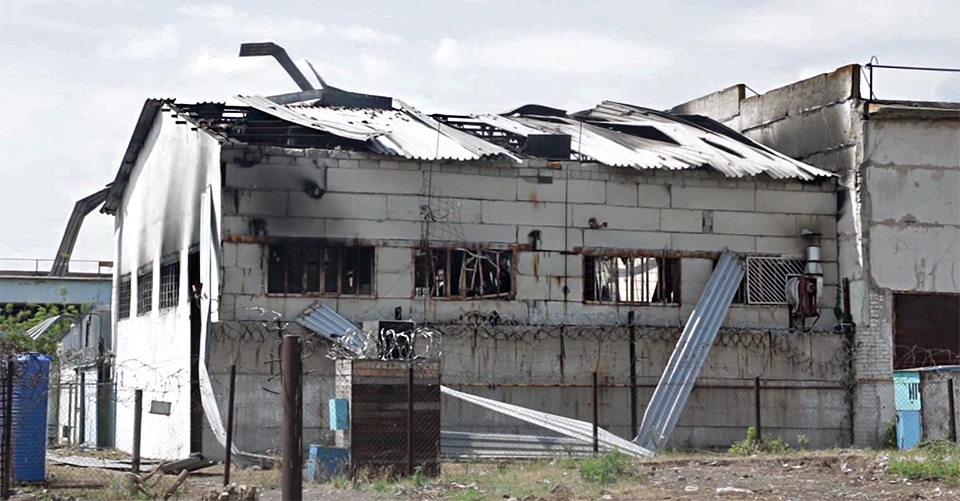
On August 23, 2022, a UN mission was established to investigate the circumstances of the killing of Ukrainian prisoners of war in Olenivka. However, this year, on January 5, UN Secretary-General Antonio Guterres disbanded the mission: the reason was that it could not deploy to the site of the attack on Ukrainian prisoners of war. Later, the UN stated that a mission to the colony in Olenivka was still possible.
In addition, on the morning of September 18, 2022, the colony in Olenivka was shelled again. According to the Russian side, one Ukrainian prisoner of war was killed as a result of the shelling.
After the mission was dissolved, the Ombudsman Dmytro Lubinets emphasized that the UN did not even condemn Russia, which did everything to prevent the international organization's mission to investigate the deaths of Ukrainian soldiers from entering the occupied Olenivka. The Ombudsman noted that he had been skeptical about the possibility of this mission from the very beginning.
The Ukrainian authorities have also repeatedly called on the International Committee of the Red Cross to send a humanitarian mission to Olenivka. The Ukrainian President's Office emphasized that if this organization does not fulfill its functions, the Ukrainian side will raise the issue of dissolving the organization. The International Committee of the Red Cross itself says it is ready to send representatives to Olenivka, but they were not allowed to do so.
In addition, a few days after the terrorist attack in Olenivka, the Red Cross stated that the committee did not guarantee the safety of Ukrainian soldiers who were leaving Azovstal and then ended up in Russian captivity. The organization emphasized that its representatives were only a neutral mediator in coordination with the parties to the conflict.
On June 26 this year, Human Rights Ombudsman Dmytro Lubinets reported that Ukrainian prisoners of war were still being held in the colony in Olenivka. Ukraine managed to identify most of the bodies of prisoners of war who died in Olenivka.
On July 25, UN High Commissioner for Human Rights Volker Türk denied Russia's claims that the Olenivka prison was allegedly shelled with HIMARS missile systems and condemned the lack of accountability for the killings of Ukrainian prisoners of war.
What caused the explosion in the colony: opinions of foreign experts
Satellite images taken the day after the tragedy show one building that was heavily damaged by the explosion. Former detainees said that this building was located in an industrial area, far from the main barracks where they were held. Also, analysts involved in mapping satellite imagery pointed to another piece of evidence that predates the explosion: excavated earth. Ukrainian officials noted that these images show traces of dug graves and that the prison was preparing to bury the dead. However, these images alone are not sufficient to confirm any burial or intention to do so.
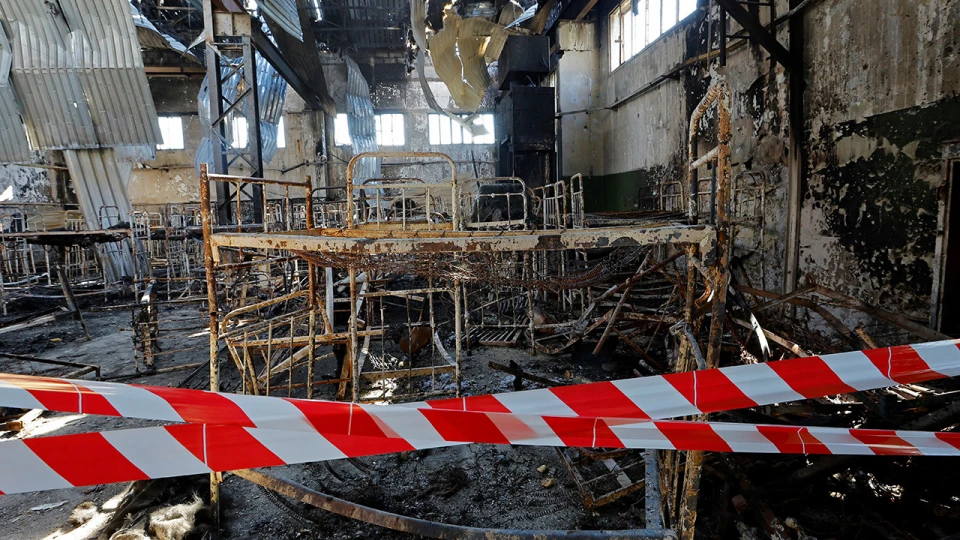
Photo: Reuters
The BBC wrote that the conclusions of the experts were surprisingly consistent. According to Bob Seddon, the British Army's chief munitions technician, it is impossible that the explosion was caused by a multiple launch rocket system. The photo shows the destruction, which was too concentrated. Despite the unspeakable horrors inside, the building itself remained relatively intact. The expert explained that an MLRS like HIMARS would cause much more damage.
In addition, as noted by Shehan Hettiarachi, a leading surgeon and chief trauma surgeon at Imperial College London, it was clear that the bodies inside the building were intact, not blown to pieces. His colleague, British doctor Saleikha Ahsan, added that some kind of incineration method seemed to have been used.
Some experts have concluded that an explosive charge, possibly enhanced with fuel, was placed inside the building. According to them, such a device could have been used to cause fire damage or destroy forensic evidence.
Returnees from hell: what the liberated from Olenivka told about captivity
"I am absolutely sure that the tragedy in Olenivka is another terrorist act by the Russian Federation, as well as the genocide of the Ukrainian people, the heroes of Azovstal and Mariupol. And I have every reason to believe so. The first fact is that the building that was blown up was located in the industrial part of the colony, and people had never been held there before. At the time of my stay in the colony and my release from it, that building was not supposed to hold people, there were no conditions there, because it was a former workshop for the production of various equipment, and in general, this part was completely stolen and destroyed. And then suddenly they stuffed beds in there and moved the prisoners of war to where the explosion took place," said Kostiantyn Velychko, a volunteer from Mariupol who had been through Olenivka colony.
According to him, during the settlement in the colony, the prisoners of war were subjected to reprisals, people were driven through the ranks, beaten with rebar and sticks, artillerymen and command staff suffered especially.
"With the appearance of the Azov fighters in the colony, interrogations and physical torture became closed, not open, as it was before, when people were beaten to death in front of our eyes. That is, they were placed in a disciplinary isolation cell, solitary confinement, music was played loudly, and only those in neighboring cells could hear screams or sounds of blows. Everything was very hidden," said Kostiantyn Velychko.
Velychko recalled that two days before the Azov soldiers arrived, more than two and a half thousand of them, the Russian flag was raised over the colony, and almost all the 'DPR representatives' were removed from the colony and Russians from different regions of the Russian Federation came to work.
Azov fighter Denys Manho Chepurko, who lost his arm while at the Azovstal plant, said that the Russian invaders wanted to blame all their crimes on the defenders of Mariupol during interrogations.
"They beat me during interrogations. The Russians wanted me to sign various statements against my command. The occupiers wanted to blame us for their crimes: that we had bombed Mariupol, etc. When I said I would not do that, the Russians beat me with sticks. The occupiers threatened to shoot me," Chepurko said.
The Russian forces in Olenivka did not adhere to any Geneva Conventions and tortured prisoners of war for 2-3 days, and gave them only 600 grams of water for two days, although this water was not potable at all. Prisoners of war were forced to run, and there was no medical care.
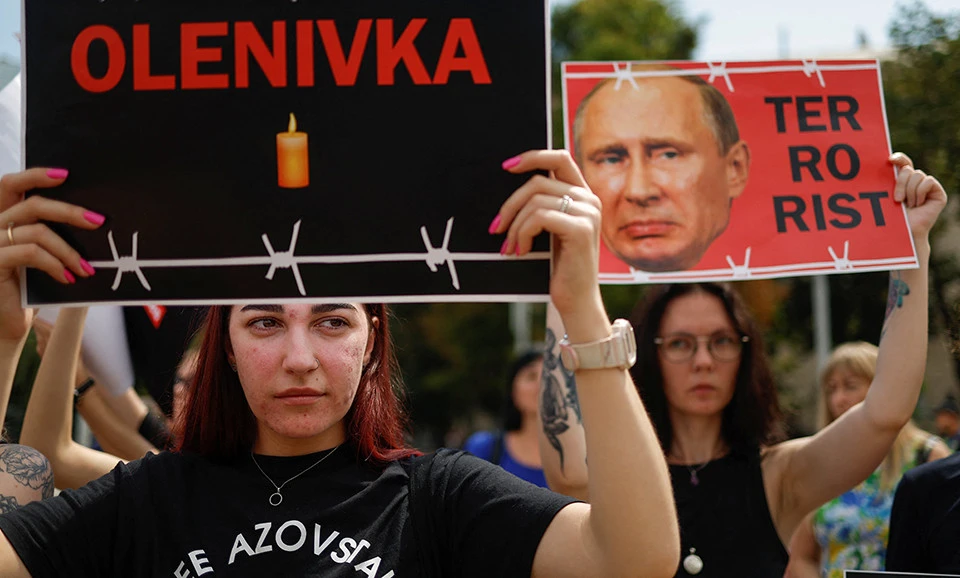
Photo: Reuters
Two explosions were heard - outside and inside: new details of the investigation
On the night of the tragedy, Ukrainians in the colony heard two explosions: one outside and one inside. In the evening of July 28, the head of the barracks where Ukrainian prisoners of war were held went around the entire territory, checked the guys, talked to the officer on duty and went to bed. It was about 11:15 pm.
"The first explosion that people heard happened somewhere outside the colony. Not everyone heard it. Someone woke up, realized that it was somewhere outside the territory, saw that everything was fine, that nothing happened, all the windows were in place, and went back to sleep. However, at about 11:30 p.m. - 12:00 a.m, there was a second explosion inside the barracks," said Maria Klymyk, author of the investigation and journalist at the Media Initiative for Human Rights.
Those soldiers who were in the main part of the barracks that was hit by the blast wave died immediately. Later, a fire broke out and their bodies burned out. In another part of the building, people were seriously injured but survived. Some of the doors were blown away. It was noted that this barracks was adjacent to another building, and as a result of one of the explosions, part of the wall fell into the neighboring building.
Then some of the detainees woke up because the roof had fallen on them. Some of the beds and people were blown away by the blast wave, so some of the bodies were just stuck between the beds. The guys had to climb over the entire structure to get to the exit.
"On the way, they also saw other people. That's why, even though they were wounded, but still had the strength to stand on their feet, they took those who could not get out on their own," said Maria Klymyk.
The soldiers did not understand what was happening, many of them were in painful shock and disoriented. They did not know where to run. An HRMMU representative suggested that some of the soldiers in the barracks may have suffocated from the smoke because they ran in the wrong direction and could not get out on their own.
It is known that on the eve of the Russian terrorist attack in Olenivka, the invading Russian forces did not let people out of the barracks, and the windows in the building were tightly closed. In the evening of July 28, they were checked and taken back to the barracks. Although the soldiers asked to stay outside because it was too hot indoors.
According to the investigator, a week before this event, the colony began to hear rumors about certain lists, which, as it turned out, concerned these 198 Azov soldiers, who were later transferred to this industrial zone, which no one knew existed before. The Azovs themselves did not know until the last moment on what basis they were selected, and they still do not know.
After a terrorist attack took place in the colony in Olenivka where Ukrainian soldiers were held, the guards opened fire on those who escaped from the barracks. On the eve of the tragedy, the military had walked the entire territory of the place where they were being held and found some weaknesses in the fence, which saved some of the people.
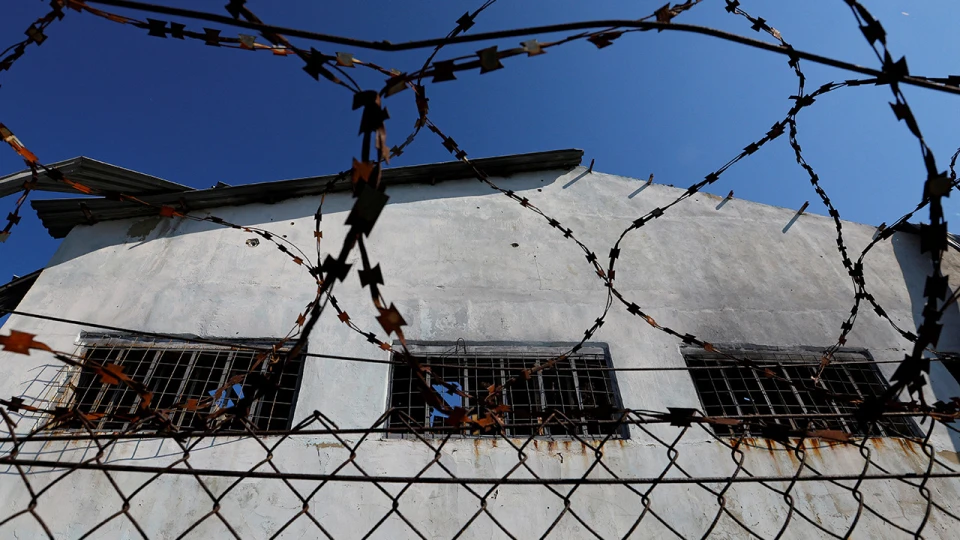
Photo: Reuters
According to the investigation, after the military could no longer do anything in the barracks itself and could not pull out the bodies of other people because of the fire, they began to get out. Not a single representative of the security or administration of the colony approached the building and helped to pull out the wounded, provide medical aid or put out the fire - everything was done by the military themselves, who made bandages from the remnants of the clothes they were wearing.
Instead, the captured medics who heard the explosions immediately gathered the few medical supplies they had and waited for the guards to come to them to take them away to provide assistance. But these doctors waited for about 2-3 hours until someone came to pick them up. According to human rights activists, 6 hours passed from the moment of the explosion until the Azov fighters were evacuated.
The soldiers were in serious condition, but no one paid attention to this, and two or three more people died in the first KamAZ on the way to the hospital, presumably because they were transported in an improper condition. According to Maria Klymyk, the next day, on July 29, one of the Azov soldiers who was not in that barracks was forced to identify the bodies of his comrades.
Russia is committing mass murder, and the world is... silent?
After the events in Olenivka on the night of July 29, 2022, a number of international organizations, including those specializing in human rights, expressed their concern. These were open letters, official statements on social media and websites. However, specialized organizations such as the ICRC or the UN system, in the opinion of the Ukrainian side, showed a certain passivity and inertia regarding the events in Olenivka, as stated by Anna Kalynchuk, a lawyer for the defenders of Mariupol, 40 days after the terrorist attack. However, an event of this magnitude requires a more substantial response than a public condemnation of the event itself.
Now, a year after the tragedy, nothing has changed - representatives of the International Committee of the Red Cross and the United Nations have never entered the territory of penal colony №120 in Olenivka.
During the presentation of the investigation into the massacre of Azov regiment soldiers in the Olenivka colony, human rights activist Andriy Yakovlev emphasized that Russia should be forced to grant international investigators access to the territory of the Olenivka colony, where several dozen Ukrainian soldiers were killed a year ago. At the same time, Dmytro Lubinets, the Verkhovna Rada Commissioner for Human Rights, expressed hope that a mission would be set up in the near future to thoroughly investigate the circumstances of the terrorist attack in Olenivka.
- News







